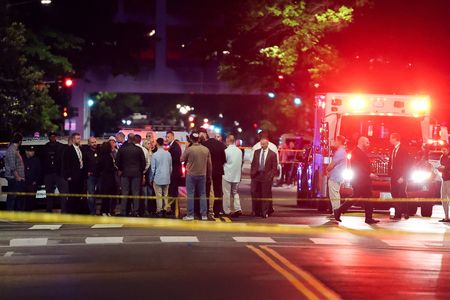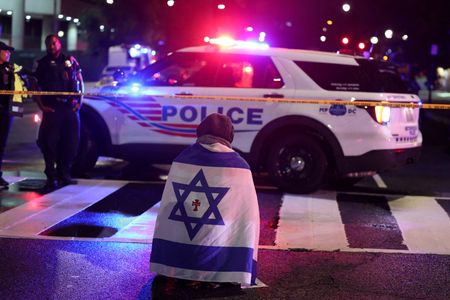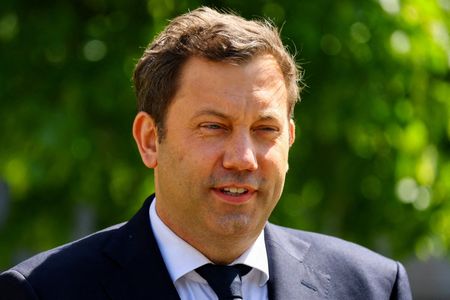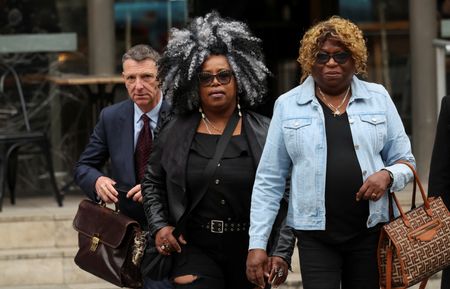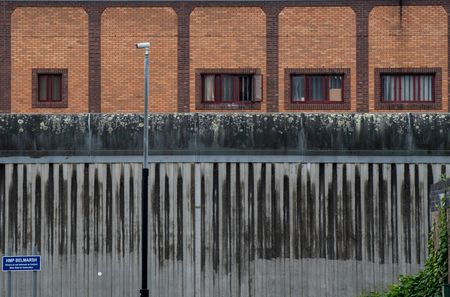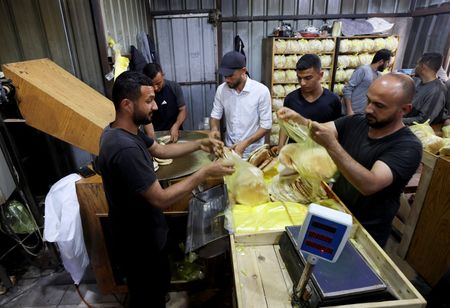By Dedi Hayun, Emily Rose and Madeline Chambers
JERUSALEM (Reuters) -When Jerusalem resident Ziv Halsband woke up to news that two staff members of the Israeli embassy in Washington had been shot dead, the software developer came to a disturbing conclusion: Jews were not safe anywhere.
“We hope that (U.S. President Donald) Trump will continue to help us and protect us all, especially in the States. And we want to be sure that we can go all over the world with confidence,” said Halsband, a tank officer during the Gaza war who was seriously wounded.
The Israeli embassy staffers, a young couple about to be engaged, were killed by a lone gunman in Washington, D.C., on Wednesday night as they left an event at the Capital Jewish Museum about 1.3 miles (2 km) from the White House.
The single suspect, identified as 30-year-old Elias Rodriguez from Chicago, chanted “Free Palestine, Free Palestine,” after being taken into custody, Washington Metropolitan Police Chief Pamela Smith said.
The attack came at a time when Israel is becoming increasingly isolated over its escalating military campaign against Hamas militants in Gaza, where it has cut off aid amid warnings of famine and reduced much of the enclave to rubble.
Israeli Foreign Minister Gideon Saar accused unnamed European officials on Thursday of “toxic antisemitic incitement” that he blamed for a hostile climate in which the Washington killings took place.
GAZA WAR
Israel launched its assault on Gaza after Hamas fighters stormed southern Israel on October 7, 2023, killing 1,200 people and taking more than 250 hostages, according to Israeli tallies.
Israel’s ground and air offensive since then has displaced nearly all Gaza’s 2.3 million residents and killed more than 53,000 Palestinians, according to Gaza health authorities.
The Washington shootings could generate sympathy for Israel from Western allies who have been piling pressure on Israeli Prime Minister Benjamin Netanyahu to ease Israel’s aid blockade on the war-ravaged territory.
“The murder of two members of the Israeli embassy near the Jewish Museum in Washington is an abhorrent act of antisemitic barbarity. Nothing can justify such violence,” said French Foreign Minister Jean-Noel Barrot.
“My thoughts go to their loved ones, their colleagues, and the State of Israel.”
Felix Klein, the German government’s commissioner for fighting antisemitism, said there was reason to fear the Washington shooting could inspire copycats “even on our own streets”.
“As a society, we should therefore remain alert, and security measures for Jewish institutions should also be strengthened in Germany,” Klein told newspapers of the FUNKE Media Group.
France’s interior minister sent a note to local authorities around the country saying that security should be reinforced at sites linked to the Jewish community, such as synagogues, and that such measures should be “visible and dissuasive”.
A spokesperson for British Prime Minister Keir Starmer said the government has offered its full support to the Israeli embassy in London.
“We obviously call on those restrictions (on aid for Gaza) to be lifted … but that does not provide any excuse whatsoever for antisemitism or attacks of this kind,” the spokesperson said.
Wednesday’s shootings are also certain to further convulse debate in the U.S. and elsewhere over the war in Gaza, which has polarised steadfast supporters of Israel and pro-Palestinian demonstrators.
Netanyahu said he was shocked at the “horrific antisemitic” murders which he said had taken place in an atmosphere of rising antisemitism and hostility to Israel. “”We are witness to the terrible cost of the antisemitism and wild incitement against the State of Israel,” he said in a statement.
SOCIAL MEDIA
The victims, Yaron Lischinsky and Sarah Lynn Milgrim, were locally employed staff, the Israeli foreign ministry said. They were both trying to promote reconciliation between Israelis and Palestinians, according to advocacy groups each belonged to.
Michael Oren, a former Israeli ambassador to the U.S. who was the target of a foiled assassination attempt by Iran during his service, said incitement on social media has changed the threat level during a difficult time of pro-Palestinian protests at U.S. university campuses.
“And honestly, we have to think as a country how we combat this incitement on social media, because it’s a serious threat. And what this does is a systematic dehumanisation of the Jews, and we know what that leads to,” he said.
Some Israelis were especially concerned that the killings took place at the Jewish Museum.
“It’s a Jewish museum, which means the hatred for Jews and the hatred for Israel both aligned. And it’s sad – we should fight it,” said Jerusalem resident Udi Tsemach.
Israeli Aviya Levi, 30, came to the conclusion that leaving Israel was too risky.
“I’m an Israeli and it makes me feel like I’m afraid. I’m afraid to go abroad. I’m afraid to. I don’t know where we’re going to come from. I have kids; it’s just going to make me afraid.”
(Additional reporting by Nidal al-Mughrabi in Cairo and James Mackenzie in Jerusalem, Madeline Chambers in Berlin, John Irish in Paris and Elizabeth Piper in London; writing by Michael Georgy; editing by Alex Richardson and Mark Heinrich)

